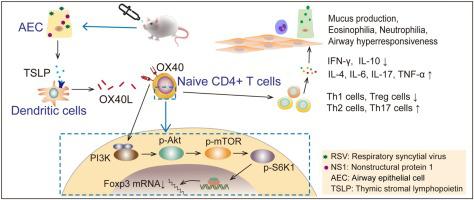Molecular Immunology ( IF 3.2 ) Pub Date : 2021-07-28 , DOI: 10.1016/j.molimm.2021.07.019 Panpan Fan 1 , Zhi Liu 1 , Mei Zheng 1 , Ming Chen 1 , Yueshi Xu 1 , Dongchi Zhao 1

|
Respiratory syncytial virus (RSV) infection in early life is associated strongly with the subsequent development and exacerbation of asthma, however, the mechanism is still ambiguous. In this study, we identified that RSV nonstructural protein (NS) 1 plays a critical role. Plasmid-mediated overexpression of NS1 induced significant airway hyperresponsiveness, eosinophilia, and mucus hyperproduction in mice. In the pNS1 group, there were markedly elevated proportions of Th2 and Th17 cells, while Th1 and Foxp3+ regulatory T cells (Tregs) significantly declined compared with the control group. Serum concentrations of interleukin (IL)-4, IL-5, IL-6, IL-17, transforming growth factor-beta, and tumor necrosis factor-alpha increased but levels of interferon-gamma and interleukin-10 declined in pNS1 group. Besides, NS1 caused a significant rise of serum thymic stromal lymphopoietin (TSLP) and OX40L levels, and a neutralizing mAb anti-OX40L was capable of promoting RSV clearance and attenuating the airway allergic inflammation caused by pNS1. Otherwise, OX40L-blocking counteracts the inhibitory effect of pNS1 on Tregs in the spleen. RSV NS1 caused elevated levels of phospho-AKT, phospho-mTOR, and phospho-S6K1, which were partially attenuated by anti-OX40L. Moreover, a specific inhibitor of mTORC1 significantly relieved the inhibition of Foxp3 expression and Tregs differentiation. Together, the data indicate that RSV NS1 protein breaks immune tolerance and induces airway inflammation and hyperresponsiveness in mice. In this process, NS1-stimulated TSLP and OX40L play a major role by inhibiting the induction of Tregs, which is at least partially mediated by modulating AKT-mTOR signaling pathways.
中文翻译:

呼吸道合胞病毒非结构蛋白 1 通过 TSLP-OX40/OX40L-mTOR 轴下调 Tregs 来破坏小鼠的免疫耐受
生命早期的呼吸道合胞病毒 (RSV) 感染与哮喘的后续发展和恶化密切相关,但其机制仍不明确。在这项研究中,我们发现 RSV 非结构蛋白 (NS) 1 起着关键作用。质粒介导的 NS1 过表达诱导小鼠显着的气道高反应性、嗜酸性粒细胞增多和粘液分泌过多。在pNS1组中,与对照组相比,Th2和Th17细胞的比例显着升高,而Th1和Foxp3+调节性T细胞(Tregs)显着下降。pNS1 组的白细胞介素 (IL)-4、IL-5、IL-6、IL-17、转化生长因子-β 和肿瘤坏死因子-α 的血清浓度增加,但干扰素-γ 和白介素-10 的水平下降。除了,NS1 导致血清胸腺基质淋巴细胞生成素 (TSLP) 和 OX40L 水平显着升高,中和 mAb 抗 OX40L 能够促进 RSV 清除并减轻由 pNS1 引起的气道过敏性炎症。否则,OX40L 阻断会抵消 pNS1 对脾脏 Treg 的抑制作用。RSV NS1 导致磷酸化 AKT、磷酸化 mTOR 和磷酸化 S6K1 的水平升高,这些被抗 OX40L 部分减弱。此外,mTORC1 的特异性抑制剂显着减轻了对 Foxp3 表达和 Tregs 分化的抑制。总之,数据表明 RSV NS1 蛋白破坏免疫耐受并诱导小鼠气道炎症和高反应性。在这个过程中,NS1 刺激的 TSLP 和 OX40L 通过抑制 Tregs 的诱导发挥主要作用,











































 京公网安备 11010802027423号
京公网安备 11010802027423号